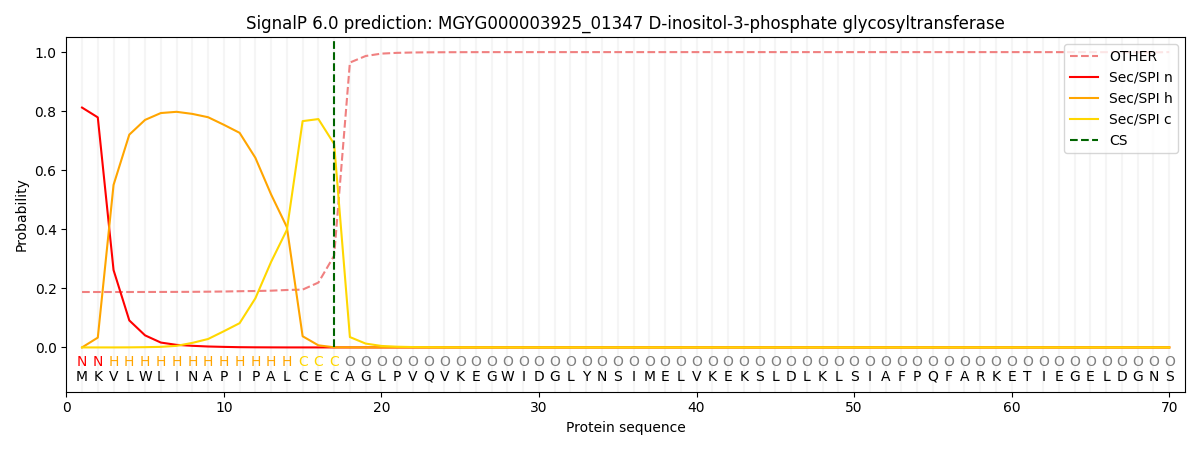You are browsing environment: HUMAN GUT
CAZyme Information: MGYG000003925_01347
You are here: Home > Sequence: MGYG000003925_01347
Basic Information |
Genomic context |
Full Sequence |
Enzyme annotations |
CAZy signature domains |
CDD domains |
CAZyme hits |
PDB hits |
Swiss-Prot hits |
SignalP and Lipop annotations |
TMHMM annotations
Basic Information help
| Species | CAG-882 sp900545175 | |||||||||||
|---|---|---|---|---|---|---|---|---|---|---|---|---|
| Lineage | Bacteria; Firmicutes_A; Clostridia; Lachnospirales; Lachnospiraceae; CAG-882; CAG-882 sp900545175 | |||||||||||
| CAZyme ID | MGYG000003925_01347 | |||||||||||
| CAZy Family | GT4 | |||||||||||
| CAZyme Description | D-inositol-3-phosphate glycosyltransferase | |||||||||||
| CAZyme Property |
|
|||||||||||
| Genome Property |
|
|||||||||||
| Gene Location | Start: 31311; End: 32609 Strand: - | |||||||||||
CDD Domains download full data without filtering help
| Cdd ID | Domain | E-Value | qStart | qEnd | sStart | sEnd | Domain Description |
|---|---|---|---|---|---|---|---|
| COG0438 | RfaB | 2.84e-29 | 72 | 432 | 55 | 381 | Glycosyltransferase involved in cell wall bisynthesis [Cell wall/membrane/envelope biogenesis]. |
| cd03801 | GT4_PimA-like | 1.19e-25 | 90 | 425 | 72 | 365 | phosphatidyl-myo-inositol mannosyltransferase. This family is most closely related to the GT4 family of glycosyltransferases and named after PimA in Propionibacterium freudenreichii, which is involved in the biosynthesis of phosphatidyl-myo-inositol mannosides (PIM) which are early precursors in the biosynthesis of lipomannans (LM) and lipoarabinomannans (LAM), and catalyzes the addition of a mannosyl residue from GDP-D-mannose (GDP-Man) to the position 2 of the carrier lipid phosphatidyl-myo-inositol (PI) to generate a phosphatidyl-myo-inositol bearing an alpha-1,2-linked mannose residue (PIM1). Glycosyltransferases catalyze the transfer of sugar moieties from activated donor molecules to specific acceptor molecules, forming glycosidic bonds. The acceptor molecule can be a lipid, a protein, a heterocyclic compound, or another carbohydrate residue. This group of glycosyltransferases is most closely related to the previously defined glycosyltransferase family 1 (GT1). The members of this family may transfer UDP, ADP, GDP, or CMP linked sugars. The diverse enzymatic activities among members of this family reflect a wide range of biological functions. The protein structure available for this family has the GTB topology, one of the two protein topologies observed for nucleotide-sugar-dependent glycosyltransferases. GTB proteins have distinct N- and C- terminal domains each containing a typical Rossmann fold. The two domains have high structural homology despite minimal sequence homology. The large cleft that separates the two domains includes the catalytic center and permits a high degree of flexibility. The members of this family are found mainly in certain bacteria and archaea. |
| pfam00534 | Glycos_transf_1 | 1.29e-21 | 236 | 398 | 6 | 153 | Glycosyl transferases group 1. Mutations in this domain of PIGA lead to disease (Paroxysmal Nocturnal haemoglobinuria). Members of this family transfer activated sugars to a variety of substrates, including glycogen, Fructose-6-phosphate and lipopolysaccharides. Members of this family transfer UDP, ADP, GDP or CMP linked sugars. The eukaryotic glycogen synthases may be distant members of this family. |
| pfam13692 | Glyco_trans_1_4 | 3.58e-17 | 236 | 369 | 5 | 118 | Glycosyl transferases group 1. |
| cd03798 | GT4_WlbH-like | 1.76e-16 | 213 | 428 | 175 | 376 | Bordetella parapertussis WlbH and similar proteins. This family is most closely related to the GT4 family of glycosyltransferases. Staphylococcus aureus CapJ may be involved in capsule polysaccharide biosynthesis. WlbH in Bordetella parapertussis has been shown to be required for the biosynthesis of a trisaccharide that, when attached to the B. pertussis lipopolysaccharide (LPS) core (band B), generates band A LPS. |
CAZyme Hits help
| Hit ID | E-Value | Query Start | Query End | Hit Start | Hit End |
|---|---|---|---|---|---|
| QII82417.1 | 5.44e-118 | 1 | 430 | 1 | 420 |
| QYF84824.1 | 5.64e-115 | 1 | 425 | 1 | 416 |
| QRN85475.1 | 3.51e-114 | 1 | 428 | 1 | 418 |
| AWE06762.1 | 1.20e-113 | 1 | 428 | 1 | 418 |
| AIQ20126.1 | 2.26e-109 | 1 | 428 | 1 | 414 |
Swiss-Prot Hits download full data without filtering help
| Hit ID | E-Value | Query Start | Query End | Hit Start | Hit End | Description |
|---|---|---|---|---|---|---|
| O34413 | 8.47e-11 | 232 | 428 | 190 | 376 | Putative glycosyltransferase YtcC OS=Bacillus subtilis (strain 168) OX=224308 GN=ytcC PE=3 SV=1 |
| P46915 | 5.35e-07 | 245 | 427 | 203 | 375 | Spore coat protein SA OS=Bacillus subtilis (strain 168) OX=224308 GN=cotSA PE=1 SV=1 |
| Q59002 | 7.38e-07 | 228 | 389 | 204 | 349 | Uncharacterized glycosyltransferase MJ1607 OS=Methanocaldococcus jannaschii (strain ATCC 43067 / DSM 2661 / JAL-1 / JCM 10045 / NBRC 100440) OX=243232 GN=MJ1607 PE=3 SV=1 |
| P71243 | 7.68e-07 | 246 | 380 | 235 | 361 | Putative colanic acid biosynthesis glycosyltransferase WcaL OS=Escherichia coli (strain K12) OX=83333 GN=wcaL PE=3 SV=2 |
| P26388 | 7.37e-06 | 246 | 381 | 235 | 362 | Putative colanic acid biosynthesis glycosyltransferase WcaL OS=Salmonella typhimurium (strain LT2 / SGSC1412 / ATCC 700720) OX=99287 GN=wcaL PE=3 SV=1 |
SignalP and Lipop Annotations help
This protein is predicted as SP

| Other | SP_Sec_SPI | LIPO_Sec_SPII | TAT_Tat_SPI | TATLIP_Sec_SPII | PILIN_Sec_SPIII |
|---|---|---|---|---|---|
| 0.197045 | 0.801221 | 0.000614 | 0.000413 | 0.000332 | 0.000346 |
